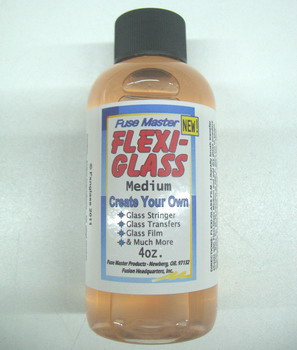
The main difference between the two is that 96 is generally softer and fuses at lower temperatures than 90. The two main COEs for fusible glass are 90 and 96. To avoid stress-cracks and breakage, it is very important to use glass that has the same COE. Fusible glass manufacturers test their glass to guarantee the COE (sometimes referred to as "tested-compatible"). To fuse multiple pieces of glass together, it's important to use glass that is compatible. in fused glass!Ī Coefficient of Expansion (COE) is simply a measurement of the rate that glass will expand and contract when it is heated and cooled.

In our never-ending quest to "Make it Easy," our Delphi Experts have compiled the following pointers to help you make your next masterpiece.
#Flexiglass medium how to
What is Flexi-Glass Medium for glass fusing?ĥ0/50 solder (2) 60/40 solder (2) air bubbles (5) annealing (6) art glass (10) bead (8) beads (6) Borax (2) Boron Nitride spray (3) bottle (8) breaking glass (2) broken pane (2) Bullseye (5) came (2) carbide wheel cutter (2) casting (10) cement (10) chat (1) COE (11) color (2) compatible (3) compatible glass (4) contour fuse (2) copper (4) copper foil (7) crushed glass (3) cutting (8) cutting circles (2) cutting glass techniques (2) Dalle de Verre (2) dalles (3) design (7) devitrification (5) devitrification spray recipe (2) dichroic (10) Didymium glasses (2) digital controller (4) dots (4) drill hole in glass (3) Effetre (2) enamel (7) enamel paints (2) encase (3) epoxy (2) etching (5) Evenheat (4) faceted glass (3) fiber paper (7) fid (2) fire brick (4) fire polish (2) fire safety (2) firing schedule (26) flashed glass (2) flux (8) foil (7) frit (26) full fuse (6) furnace glass (3) fused glass (26) fusing (73) glass (33) glass bead (5) glass blowing (3) glass bottles (5) glass casting (9) glass clay (3) glass cutter (8) glass cutting (4) Glass Eye 2000 (2) glass kiln (10) glass painting (18) glass powder (6) glass rod (9) glass stain (3) glue (3) grinder (3) grinder bits (2) grout (2) hake brush (2) harrach glass (159) hot glass (6) hot head (3) how to set up a torch (2) jewelry (4) jewels (3) kiln (107) kiln furniture (3) kiln schedule (20) kiln shelf (3) kiln wash (15) kilns (7) lampwork (47) lampwork press (2) lampworking (8) lead came (11) lead knife (3) leaded glass (12) mandrels (4) mold (13) molds (17) Moretti (3) Morton System (3) mosaic (6) oxidation (1) pate de verre (5) patina (2) pattern (5) pattern bars (6) pendant (7) pot melt (5) powder (1) presses (3) Primo Primer (3) RampMaster II (2) reactive colors (2) recycled glass (9) reducing flame (2) repair (10) resist (6) restoration (3) reusche (5) safety (7) sandblasting (7) schedules (4) score glass (3) sheet glass (5) shelf paper (4) shelf primer (6) slumping (15) soft glass (4) solder (10) soldering iron (4) stained glass (22) stained glass window (7) steel mold (3) stringer (6) supplies (4) tack fuse (4) thermocouple (5) Tiffany (5) tools (5) torch (13) tutorial (76) video (89) wine bottle (16) YouTube (85)ġ04 coe (1) 220 volt (1) 50/50 solder (2) 60/40 solder (2) Aanraku Frit Maker (1) Aanraku Frit Sorter (1) abrasive (1) accent (1) acids (1) advertise (6) agreement (1) air bubbles (5) air compressor (2) aluminum oxide (1) android (1) annealing (6) aperature pour (1) app (1) Arrow Springs (1) art (3) art glass (10) ArtGlass Clay (1) artist (2) avatar (2) Banner (2) bar code scanner (1) Baroque (1) base metals (1) bead (8) bead door (1) bead release (1) bead release recipe (1) beads (6) beer bottle (4) bending glass (1) Bethlehem (1) Betta (1) betterstainedglass.Any glass will melt in a kiln when you heat it up fusing glass successfully depends on knowing how different glasses work together.


 0 kommentar(er)
0 kommentar(er)
